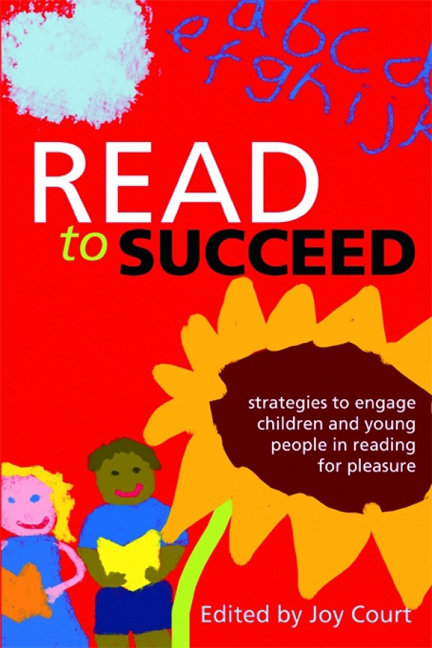Book contents
- Frontmatter
- Dedication
- Contents
- Foreword
- Contributors
- Introduction
- 1 It's never too soon to start
- 2 How children begin to read
- 3 Creating young readers: teachers and librarians at work
- 4 The six dimensions of the ‘honeycomb’ model, and its implications for literacy, libraries and literature in New Zealand
- 5 The Summer Reading Challenge in libraries: a continuing success
- 6 Stockport does Book Idol! A case study linking libraries and schools to inspire reading for pleasure
- 7 There and back again: restoring reading to the classroom
- 8 Promoting excellence: shadowing the CILIP Carnegie and Kate Greenaway Medals
- 9 Choice and motivation: local book awards
- 10 The sport of reading
- 11 Adventures in the book trade: libraries and partnerships
- 12 The hard-to-reach reader in the 21st century
- 13 Creative reading and insideadog.com.au
- Index
- Miscellaneous Endmatter
- Miscellaneous Endmatter
- misc-endmatter
- Frontmatter
- Dedication
- Contents
- Foreword
- Contributors
- Introduction
- 1 It's never too soon to start
- 2 How children begin to read
- 3 Creating young readers: teachers and librarians at work
- 4 The six dimensions of the ‘honeycomb’ model, and its implications for literacy, libraries and literature in New Zealand
- 5 The Summer Reading Challenge in libraries: a continuing success
- 6 Stockport does Book Idol! A case study linking libraries and schools to inspire reading for pleasure
- 7 There and back again: restoring reading to the classroom
- 8 Promoting excellence: shadowing the CILIP Carnegie and Kate Greenaway Medals
- 9 Choice and motivation: local book awards
- 10 The sport of reading
- 11 Adventures in the book trade: libraries and partnerships
- 12 The hard-to-reach reader in the 21st century
- 13 Creative reading and insideadog.com.au
- Index
- Miscellaneous Endmatter
- Miscellaneous Endmatter
- misc-endmatter
Summary
‘Read to Live’ – all of the contributors to this book would very much agree with Gustav Flaubert's (1857) motto and, in all their different voices and with all their very different experiences and knowledge, they share with me the absolute and fundamental belief that it is essential for the life chances of every child, everywhere, that they can read.
In this introduction I will highlight some of the UK policy framework and international research evidence that underpins this belief. Although most of the contributors are from the UK and reflect UK experience, the issues faced and strategies developed are more universal. Every country will have its own political agenda, but readers will be able to recognize how campaigners for libraries and reading have used the current context to best advantage, and will gain insight from this. Thus the subsequent chapters will take us from the very youngest potential readers to young people on the fringes of society in some of the most deprived socio-economic neighbourhoods in the UK, covering some of the most innovative and yet long-standing and successful reading promotion strategies in the world. We have envisaged our readers as those who are trying to find out the background and context to child reader development in libraries and schools and to equip themselves to take this development forward. They may be a student librarian, a teacher or consultant concerned with reading and literacy, a practitioner in either field with new responsibilities or an established practitioner or manager looking for ideas and inspiration.
As former Children's Laureate, Michael Morpurgo, put it so beautifully in an article in The Times in 2009:
Without the sunlight of literature children cannot grow as they should. We know that from books come knowledge and understanding, that they are a source of infinite joy and fun, that they stimulate imagination and creativity, that they open eyes and minds and hearts. It is through the power and music and magic of stories and poems that children can expand their own intellectual curiosity, develop the empathy and awareness that they will need to tackle the complexities of their own emotions, of the human condition in which they find themselves. And it's through books that we can learn the mastery of words, the essential skill that will enable us to express ourselves well enough to achieve our potential in the classroom and beyond.
(Morpurgo, 2009)- Type
- Chapter
- Information
- Read to SucceedStrategies to Engage Children and Young People in Reading for Pleasure, pp. xvii - xxxPublisher: FacetPrint publication year: 2011

